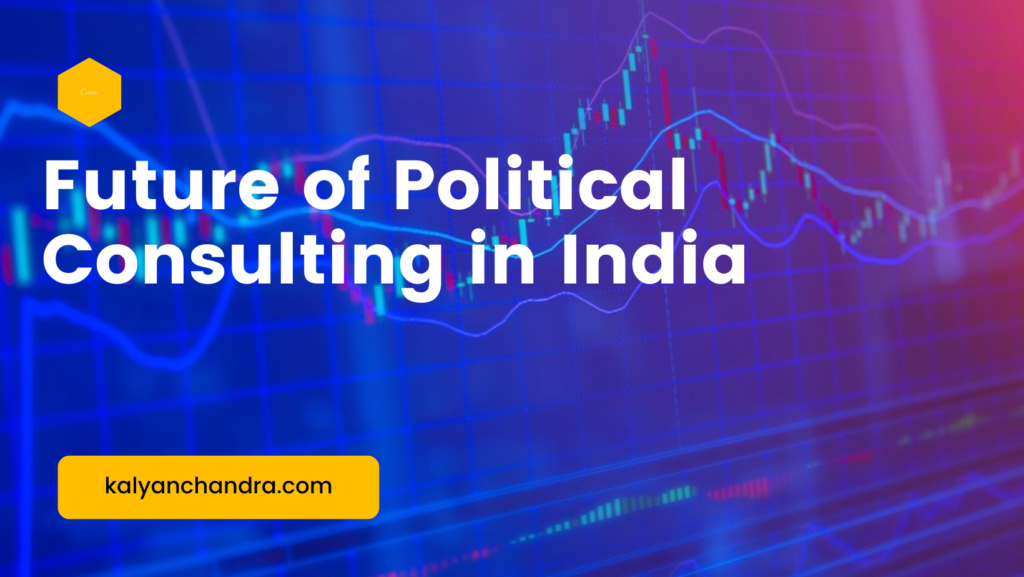Introduction
Political consulting in India is undergoing a transformative shift, driven by technological advancements, changing voter demographics, and evolving campaign strategies. As the world’s largest democracy, India’s political landscape offers a unique and complex environment for political consultants. This article explores the future of political consulting in India, highlighting key trends and predictions that are shaping this dynamic field.
The Rise of Data-Driven Campaigns
1. Big Data and Analytics
One of the most significant trends in political consulting is the increasing reliance on big data and analytics. Political consultants are now leveraging sophisticated data tools to analyze voter behavior, preferences, and trends. This data-driven approach allows for more targeted and efficient campaigning, ensuring that political messages reach the right audience.
2. Predictive Modeling
Predictive modeling is becoming a crucial tool for political consultants. By analyzing past election data, demographic information, and social media trends, consultants can forecast election outcomes and tailor their strategies accordingly. This predictive capability enhances the effectiveness of campaigns and improves the allocation of resources.
The Role of Social Media
3. Social Media Influencers
Social media platforms have revolutionized political campaigning in India. The use of social media influencers to sway public opinion is a growing trend. These influencers, with their large and engaged followings, can significantly impact voter perceptions and decisions.
4. Real-Time Engagement
Real-time engagement with voters through social media is another critical trend. Political consultants are now utilizing live videos, instant polls, and interactive content to engage with the electorate. This immediacy fosters a more personal connection between candidates and voters, enhancing trust and support.
The Emergence of Digital Campaigning
5. Digital Advertising
Digital advertising is set to dominate political campaigns in the coming years. With the widespread use of smartphones and internet penetration in India, digital ads offer a cost-effective way to reach a vast audience. Political consultants are investing heavily in digital marketing strategies, including search engine optimization (SEO), pay-per-click (PPC) campaigns, and social media ads.
6. Mobile Campaigning
Mobile campaigning is another trend that is gaining momentum. With a significant portion of the Indian population accessing the internet through mobile devices, political consultants are developing mobile-friendly content and apps to engage voters. SMS campaigns, mobile apps, and WhatsApp messages are becoming essential tools for political outreach.
The Impact of Artificial Intelligence
7. AI-Driven Insights
Artificial intelligence (AI) is revolutionizing political consulting by providing deeper insights into voter behavior and preferences. AI algorithms can analyze vast amounts of data to identify patterns and trends that human analysts might miss. These insights enable political consultants to make informed decisions and fine-tune their strategies.
8. Chatbots and Virtual Assistants
The use of chatbots and virtual assistants in political campaigns is on the rise. These AI-powered tools can handle a wide range of tasks, from answering voter queries to conducting surveys. They provide a scalable way to engage with a large number of voters, enhancing the efficiency of campaign operations.
The Shift Towards Ethical Campaigning
9. Transparency and Accountability
As voters become more aware and discerning, there is a growing demand for transparency and accountability in political campaigns. Political consultants are increasingly focusing on ethical campaigning practices, including transparent funding, clear communication, and responsible data usage.
10. Voter Education
Educating voters about their rights and the electoral process is becoming a priority for political consultants. Voter education initiatives, both online and offline, are essential to ensure an informed electorate. These initiatives help build trust and credibility, which are crucial for the success of any political campaign.
The Future Landscape
11. Hyper-Local Campaigning
Hyper-local campaigning is expected to be a significant trend in the future. Political consultants will focus on addressing local issues and concerns, tailoring their messages to resonate with specific communities. This localized approach can enhance voter engagement and support.
12. Collaborative Campaigns
Collaboration between political parties, consultants, and grassroots organizations is likely to increase. By working together, these entities can pool resources, share insights, and coordinate efforts for more effective campaigning. Collaborative campaigns can also foster a sense of unity and shared purpose among voters.
Conclusion : The future of political consulting in India is poised for exciting developments, driven by technological advancements and changing voter expectations. As political consultants adapt to these trends, they will play a crucial role in shaping the country’s democratic process. By embracing data-driven strategies, leveraging social media, and prioritizing ethical practices, political consultants can navigate the complexities of India’s political landscape and achieve success in the years to come.
Case Studies in Political Consulting in India
1. Narendra Modi’s 2014 Election Campaign
Overview: Narendra Modi’s 2014 Lok Sabha election campaign is one of the most notable examples of modern political consulting in India. The campaign was marked by a strategic use of technology, social media, and data analytics.
Key Strategies:
- Data Analytics: The campaign used big data to analyze voter behavior and preferences, enabling targeted messaging.
- Social Media: Extensive use of platforms like Facebook, Twitter, and WhatsApp to engage with young and urban voters.
- Chai Pe Charcha: An innovative campaign where Modi interacted with voters over tea, creating a sense of personal connection.
Outcome: The campaign successfully projected Narendra Modi as a candidate of change, leading to a landslide victory for the Bharatiya Janata Party (BJP).
2. Arvind Kejriwal’s 2015 Delhi Assembly Campaign
Overview: Arvind Kejriwal and the Aam Aadmi Party (AAP) used grassroots mobilization and data-driven strategies to secure a decisive victory in the 2015 Delhi Assembly elections.
Key Strategies:
- Door-to-Door Campaigning: Volunteers engaged in direct interactions with voters to understand and address their concerns.
- Data Collection: Collection and analysis of voter data to identify key issues and tailor campaign messages.
- Transparency: Emphasis on transparency and accountability to build trust among voters.
Outcome: AAP won 67 out of 70 seats, demonstrating the effectiveness of grassroots mobilization and data-driven strategies.
3. M.K. Stalin’s 2021 Tamil Nadu Assembly Election Campaign
Overview: M.K. Stalin’s campaign for the 2021 Tamil Nadu Assembly elections highlighted the importance of digital outreach and targeted communication.
Key Strategies:
- Digital Campaigning: Use of digital platforms for campaign outreach, particularly focusing on the youth demographic.
- Localized Messaging: Tailoring messages to address specific local issues and concerns of different regions within Tamil Nadu.
- AI Tools: Utilization of AI tools for voter sentiment analysis and predictive modeling.
Outcome: The Dravida Munnetra Kazhagam (DMK) secured a majority, showcasing the impact of digital and localized campaign strategies.
4. Mamta Banerjee’s 2021 West Bengal Assembly Election Campaign
Overview: Mamta Banerjee’s 2021 campaign for the West Bengal Assembly elections was characterized by robust grassroots engagement and the strategic use of social media.
Key Strategies:
- Grassroots Engagement: Strong focus on direct voter interaction and addressing local grievances.
- Social Media Campaigns: Use of social media platforms to counter opposition narratives and mobilize support.
- Emotional Appeals: Leveraging emotional and cultural appeals to strengthen voter loyalty.
Outcome: The Trinamool Congress (TMC) won a decisive victory, highlighting the power of grassroots engagement and emotional appeals in political campaigns.
5. Andhra Pradesh 2019 Assembly Elections – Y.S. Jagan Mohan Reddy
Overview: Y.S. Jagan Mohan Reddy’s 2019 campaign for the Andhra Pradesh Assembly elections demonstrated the effectiveness of long-term voter engagement and strategic planning.
Key Strategies:
- Padayatra (Foot March): A 3,648-km long foot march across the state, interacting directly with voters and understanding their issues.
- Data-Driven Insights: Use of data analytics to identify key voter concerns and prioritize campaign issues.
- Promises of Welfare Schemes: Clear articulation of welfare schemes and how they would benefit different sections of society.
Outcome: The Yuvajana Sramika Rythu Congress Party (YSRCP) won a sweeping victory, underscoring the impact of sustained voter engagement and strategic promises.

Kalyan Chandra
Kalyan chandra is a political strategist, media and communication consultant with the expertise in public relations, marketing, political research, election campaign management, psephology and digital analytics. He focuses on strategic political consulting, offering services that include competitive research, public opinion collection, and digital media management. Kalyan has significantly contributed to successful campaigns across India with his meticulous approach and deep understanding of the political landscape.

